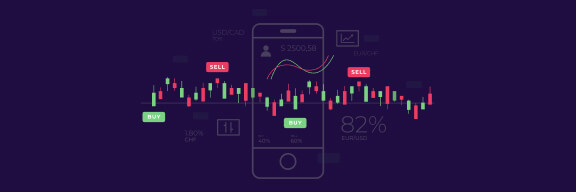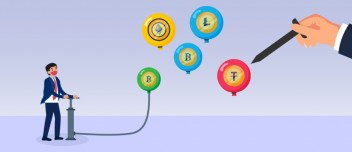If you’re new to investing, you might be looking at different types of markets you can invest in, such as the Forex market.
This article will tell you everything you need to know to answer the question of “is Forex trading legit?”
By the time you finish reading, you should know enough to make your own decisions about whether or not to invest in Forex, and be aware of the associated risks of different Forex trading scams.
What Is Forex?
Forex stands for Foreign Exchange Market, which is the market on which you can buy, sell, and trade foreign currencies. For example, you can convert one type of currency, such as US dollars, into another, like Euros.
All Forex trades are expressed as a pair of two different national currencies being exchanged. Here are the big ones, which account for approximately 75% of all Foreign Exchange Market trades:
- EUR/USD
- USD/JPY
- GBP/USD
- AUD/USD
- USD/CAD
- USD/CHF
- NZD/USD
Currency prices in Forex are driven by supply and demand, as well as other global factors, such as economic growth and political climate.

So, Is Forex Legit or a Scam?
The Forex market is a legitimate market, in which banks, financial institutions, and individuals trade currencies with the goal of making profits.
Forex trading is considered a high-risk investment, because it’s what’s known as a zero sum market. This means that for someone to make money on a trade, someone else has to lose money. In other words, one person’s gain is equal to another person’s loss.
Experienced traders are sometimes able to do quite well trading in Forex, but new traders should be aware of the different Forex trading scams out there or they can end up losing all their funds in the Forex market.
Popular Forex Scams To Be Aware Of
Signal Sellers
Signal sellers are people or organizations who sell information about what Forex trades to make.
Though there are legitimate signal sellers with good information that can make you money, there are also scammers who sell bad investment advice, thus losing you whatever fee you pay them plus, most probably, a bunch of money on bad investments.
These scam signal sellers often load up fraudulent sites with fake Forex trading reviews to gain your trust and trick you into paying for their services.
High Yield Investment Program (HYIP)
HYIPs, also known as Forex trading systems or education courses, are a type of Forex scam in which the perpetrators make too-good-to-be-true promises about how much money you can make trading Forex — if you just sign up for their investment program.
In reality, once you sign up for such a program, the focus is almost always on recruiting more people to join it (so the scammers make more sign-up fees), instead of actually on investing.
You may get access to some courses and other training materials, but they aren’t going to give the promised results and make you a bunch of money.
Manipulation of Bid
Forex bid manipulation scams are run by fraudulent brokers who manipulate the bid-ask spread on computers to make themselves more money on trades they facilitate.
Though less common than they used to be, you can still spot these scams by looking out for spreads of 7-8 pips, instead of the normal 2-3.
Software Scams: Forex Trading Reviews
Forex trading software scams are a type of signal seller scams in which the fraudsters sell you trading bot software and claim that it will provide you with exclusive information that will make you a bunch of money. As with most signal seller scams, they earn your trust through fake reviews of the Forex trading software.
Though you might actually get access to some type of signal seller bot, they are most likely very rudimentary and should not be trusted for legitimate trading advice. After all, if the bots were so great at giving trading advice, why wouldn’t the scammers just keep the software to themselves and get rich trading?
Managed Accounts
Scammers sometimes pose as investment account managers, claiming that they can earn you huge returns on investments if you let them take control of your funds.
The reality is that they just spend it on themselves, often spending exorbitant sums on personal luxury items. Then, when you ask to get your money back, they will probably make up some complex story about how you lost it on a trade.
Ponzi and Pyramid Schemes
Ponzi and pyramid Forex trading scams involve someone promising you a big ROI for a small up-front payment. After you agree, you usually see a small return on your investment, just enough to get you to trust the people running the pyramid scheme.
Then, they scammers pressure you to get friends and family members to sign up for the trading scheme, offering you commissions for every person you recruit. The more people join, the more money gets filtered up the pyramid to the people at the top.
The Ponzi scammers know exactly how much money to give you to keep you interested and recruiting more people, but you’ll never see the big returns they promised initially.
How a Chargeback Company Can Help You Recover from a Forex Scam
If you’ve lost money through a Forex trading scam, one of the best ways to get your money back is through a chargeback.
This is a process offered by your credit card provider in which you can dispute a fraudulent charge to get the money “charged back,” or returned, to the card with which you made a payment.
So, for example, if you use a credit card to pay a scam signal seller or to sign up for a scam investment program, you may be able to simply get the charges reversed by disputing them with your financial institution.
For the highest chances of success, it’s often best to hire a professional chargeback company to present the evidence to your bank or card issuer. These companies have experience with getting chargebacks approved for thousands of clients just like you, and know how to present the evidence in the best way to get your dispute approved.






